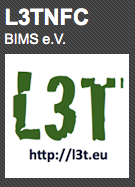Our publication about „Game Based Learning Through Near Field Communication“ is now published in the book Game-Based Learning: Theory, Strategies and Performance Outcomes.
Abstract:
Near Field Communication (NFC) is a technology mainly known from the payment and ticketing sector. Due to its availability on smartphones NFC provides a far untapped potential for a variety of different applications. As part of researches regarding NFC and its usability in educational areas, the operational capability of NFC has been tested in the field of game based learning. The result was an Android-based quiz application (“NFCQuiz”) working in multiplayer mode, meaning that several players can exchange their answers through the use of NFC during the game. The application provides educators the possibility to store his/her own questions and answers on a tag. During the game one player reads the tag and can send the contained information to multiple players over Android Beam. The exchange of the given answers and the calculation of the leader board are in turn done over a NFC connection.
Such an application is expected to bring different benefits. Both, question generation and data exchange are handled over NFC. As a result no internet access is needed for participating in the game. Since the used tags are re-writable there are basically no limits in term of reuse. Another benefit resulting from the usage of tags is that parents/teachers can control the used questions and answers. A NFC-based game is also supposed to give players an additional interactive effect by holding the phones for synchronization, which in turn keeps the participants interested.
This research work gives an overview of the “NFCQuiz” application regarding its functionality and implementation. Moreover we discuss the advantages and disadvantages of the app with respect to similar games and the overall potential of NFC in the educational sector.
[Draft article @ ResearchGate]
Reference: Lamija, D., Ebner, M. (2017) Game Based Learning Through Near Field Communication. Game-Based Learning Theory, Strategies and Performance Outcomes. Youngkyun B. (ed.). Nova publisher. pp. 295-322

